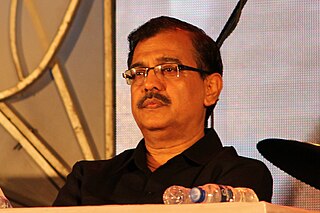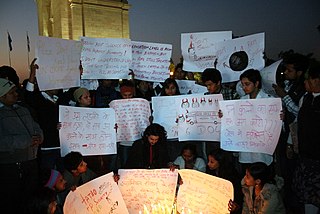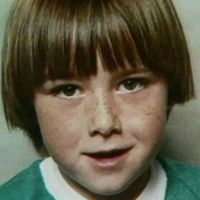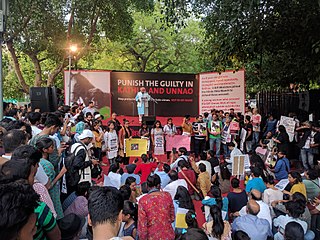Related Research Articles
Life imprisonment is any sentence of imprisonment for a crime under which convicted criminals are to remain in prison for the rest of their natural lives. Crimes that warrant life imprisonment are usually violent and/or dangerous. Examples of crimes that result in life sentences are murder, torture, terrorism, child abuse resulting in death, rape, espionage, treason, Illegal drug trade, human trafficking, severe fraud and financial crimes, aggravated Property damage, arson, hate crime, kidnapping, burglary, and robbery, piracy, aircraft hijacking, and genocide.

Capital punishment in India is a legal penalty for some crimes under the country's main substantive penal legislation, the Indian Penal Code, as well as other laws. Executions are carried out by hanging as the primary method of execution as given under Section 354(5) of the Criminal Code of Procedure, 1973 is "Hanging by the neck until dead", and is imposed only in the 'rarest of cases'.

Caning is a widely used form of corporal punishment in Singapore. It can be divided into several contexts: judicial, prison, reformatory, military, school and domestic. These practices of caning as punishment were introduced during the period of British colonial rule in Singapore. Similar forms of corporal punishment are also used in some other former British colonies, including two of Singapore's neighbouring countries, Malaysia and Brunei.
Tay Yong Kwang is a Singaporean judge of the Supreme Court. He was first appointed Judicial Commissioner in 1997, appointed Judge in 2003, and appointed Judge of Appeal in 2016. He was noted for being the presiding judge in several notable cases that shocked the nation and made headlines in Singapore.

Asumal Sirumalani Harpalani, known by devotees as Asaram, is an Indian spiritual leader and convicted rapist, who started to come into the limelight in the early 1970s. By 2013, he was estimated to have established over 400 ashrams and 40 schools in India and abroad.
The Kherlanji massacre refers to the murders of four Scheduled Caste citizens by villagers of Khairlanji on 29 September 2006. The killings took place in a small village in India named Kherlanji, located in the Bhandara district of the state of Maharashtra.
This is a list of notable overturned convictions in the United States.
The Jeanine Nicarico murder case was a complex and influential homicide investigation and prosecution in which two men, Rolando Cruz and Alejandro Hernandez, both Latinos, were wrongfully convicted of abduction, rape and murder in 1985 in DuPage County, Illinois. They were both sentenced to death. The case was scrutinized during appeals for being weak in evidence.
In the United States, life imprisonment is the most severe punishment provided by law in states with no valid capital punishment statute, and second-most in those with a valid statute. According to a 2013 study, 1 of every 2 000 inhabitants of the U.S. were imprisoned for life as of 2012.

Ujjwal Nikam is an Indian special public prosecutor who has worked on prominent murder and terrorism cases. He helped prosecute suspects in the 1993 Bombay bombings, the Gulshan Kumar murder case, the Pramod Mahajan murder case, and the 2008 Mumbai attacks. He was also the special public prosecutor in the 2013 Mumbai gang rape case, 2016 Kopardi rape and murder case. Ujjwal Nikam argued on behalf of the state during the 26/11 Mumbai attack trial.
Naina Sahni was the victim of the 1995tandoor murder case. On 2 July 1995, 29-year-old Sahni was killed by her husband Sushil Sharma, an Indian National Congress youth leader. Sushil Sharma was convicted for the murder by the Trial Court, Delhi High Court and Supreme Court. In October 2013, Sharma's death penalty was commuted to life imprisonment by the Supreme Court.

The 2012 Delhi gang rape and murder, commonly known as the Nirbhaya case, involved a rape and fatal assault that occurred on 16 December 2012 in Munirka, a neighbourhood in South Delhi. The incident took place when Jyoti Singh, a 22-year-old physiotherapy intern, was beaten, gang-raped, and tortured in a private bus in which she was travelling with her male friend, Avnindra Pratap Pandey. There were six others in the bus, including the driver, all of whom raped the woman and beat her friend. She was rushed to Safdarjung Hospital in Delhi for treatment and transferred to Singapore eleven days after the assault, where she succumbed to her injuries 2 days later. The incident generated widespread national and international coverage and was widely condemned, both in India and abroad. Subsequently, public protests against the state and central governments for failing to provide adequate security for women took place in New Delhi, where thousands of protesters clashed with security forces. Similar protests took place in major cities throughout the country. Since Indian law does not allow the press to publish a rape victim's name, the victim was widely known as Nirbhaya, meaning "fearless", and her struggle and death became a symbol of women's resistance to rape around the world.
On 7 June 2013, a 20-year-old college student was abducted, gang-raped and murdered in Kamduni village, 16km from Barasat, North 24 Parganas district about 20km from main Kolkata. In January 2016 the accused were sentenced to death and life imprisonment.

The 2013 Mumbai gang rape, also known as the Shakti Mills gang rape, refers to the incident in which a 22-year-old photojournalist, who was interning with an English-language magazine in Mumbai, was gang-raped by five people including a juvenile. The incident occurred on 22 August 2013, when she had gone to the deserted Shakti Mills compound, near Mahalaxmi in South Mumbai, with a male colleague on an assignment. The accused had tied up the victim's colleague with belts and raped her. The accused took photos of the victim during the sexual assault, and threatened to release them to social networks if she reported the rape. Later, an eighteen-year-old call centre employee reported that she too had been gang-raped, on 31 July 2013 inside the mills complex.

Kylie Maria Antonia Maybury was an Australian schoolgirl from Preston, an inner-city suburb of Melbourne, Victoria, Australia. Maybury was kidnapped, raped, and murdered on 6 November 1984, the date of the 1984 Melbourne Cup Day; and she was nicknamed in the Melbourne tabloid newspaper The Sun News-Pictorial as the Cup Day Girl.
Umesh Reddy is a serial rapist and serial killer from India. He confessed to killing 18 women, and was convicted in 9 cases. The police believe that he raped at least 20 women in the states of Karnataka, Maharashtra and Gujarat. They also suspect that several of his crimes have not been reported, because the victims feared social stigma.

The Unnao rape case refers to the gang rape of a 17-year-old girl on 4 June 2017 in Unnao, Uttar Pradesh, India. On 16 December 2019, former BJP MLA Kuldeep Singh Sengar was convicted for the rape on 20 December 2019 and sentenced to life imprisonment. Further, Sengar was found guilty in the death of the girl's father in judicial custody.

Life imprisonment is a legal penalty in Singapore. This sentence is applicable for more than forty offences under Singapore law, such as culpable homicide not amounting to murder, attempted murder, kidnapping by ransom, criminal breach of trust by a public servant, voluntarily causing grievous hurt with dangerous weapons, and trafficking of firearms, in addition to caning or a fine for certain offences that warrant life imprisonment.
References
- ↑ "High court commutes murder convict Dharampal's death sentence into life imprisonment". Hindustan Times. Hindustan Times. 21 April 2015. Retrieved 31 July 2018.
- ↑ "High Court commutes convict Dharampal's death sentenced into life imprisonment". Indian Express. Indian Express. 22 April 2015. Retrieved 31 July 2018.
- ↑ "Stay on Dharampal's execution extended till Jan 31". Times of India. 11 December 2013. Retrieved 31 July 2018.